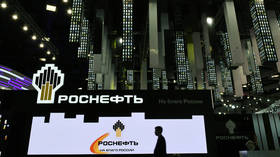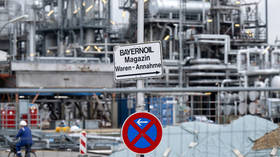Russian oil giant reports major profit surge

Net profits at Rosneft, Russia’s largest oil producer, jumped by 47.2% last year, hitting 1.3 trillion rubles ($14 billion) despite sweeping Western sanctions on Russian oil, the company announced on Monday.
Crude oil and gas condensate production reached 193.6 million tons in 2023, Rosneft said, adding that it was working to build up its gas production capacity in the face of oil restrictions.
Analysts polled by Interfax had expected the company’s earnings to be smaller at $13.5 billion.
Total hydrocarbon output last year amounted to 269.8 million tons, including 92.7 billion cubic meters of gas.
Rosneft’s earnings before interest, tax, depreciation and amortization (EBITDA) surged by 17.8% to 3 trillion rubles ($34 billion), with revenues climbing by 1.3% to 9.2 trillion rubles (nearly $100 billion).
“As a result of strict cost control and work to improve efficiency, the unit cost of hydrocarbon production at year-end 2023 decreased to $2.6 barrel of oil equivalent,” Rosneft CEO Igor Sechin said in a statement.
The energy giant reported soaring profits even as it is embroiled in a legal dispute over its assets in Germany, which the news outlet Politico estimate to be valued at about $7 billion.
In 2022, in the wake of the Ukraine conflict, the German federal government took control of Rosneft’s assets in the country and placed them under a trusteeship. Most prominent among these assets is the Schwedt refinery, where the company is the majority shareholder.
Earlier this month, media reports revealed that the German authorities were discussing taking possession of the refinery.
The Schwedt plant accounts for half of the fuel supply to the eastern part of Germany and around 11% of the country’s total.
While Berlin views the nationalization as a way of securing its longer-term energy needs, experts warn the move could risk supply cuts and result in a major payout to Moscow.
Russia has responded by saying that nationalizing Rosneft’s assets in Germany would be tantamount to confiscation, a step that would have far-reaching consequences.
For more stories on economy & finance visit RT's business section













